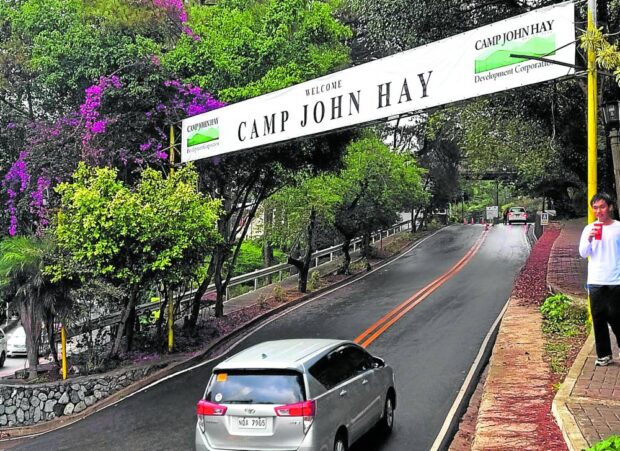
GATEWAY Camp John Hay, a former US base in Baguio City, is administered by the Bases Conversion and Development Authority, including the 13 villages within, which the city wants separated from camp land. —NEIL CLARK ONGCHANGCO
BAGUIO CITY—The city council on Monday objected to a congressional measure now being discussed at the Senate which would extend the corporate life of the Bases Conversion and Development Authority (BCDA) and allow it to sell portions of former American military base lands, like Camp John Hay in this city.
House Bill No. 8505 proposed to amend Republic Act No. 7227 (the BCDA Act of 1992) by granting 50 more years to the operation of the base lands administrator. The BCDA, which was given a 50-year life span, or until 2042, was created a year after the Senate rejected the extension of the United States’ military presence in the country.
The bill also empowers the government corporation to sell 5 percent of lands within BCDA- controlled economic zones to potential residents. It was passed in August by the House of Representatives and is undergoing technical review by the Senate committee on government corporations and public enterprises.
Baguio Rep. Marquez Go, a coauthor of HBN 8505, told the council on Monday that he tried to exclude John Hay from the list of base lands that could be converted into alienable and disposable properties but the final version of the bill did not explicitly spare John Hay.
Go said he would raise the issue again with the Senate.
Unmet obligations
The BCDA has custody over 625 hectares of the John Hay reservation, including its vast forest and a 288-ha special economic zone. It was originally entrusted with 566.097 ha of the former baseland but was granted custody over 31.8 ha of the former Voice of America (VOA) compound and the 27-ha US Ambassador’s Residence.
“Baguio residents would resist” if John Hay lands were sold, said Vice Mayor Faustino Olowan, noting that was due to the BCDA’s unfulfilled obligations to the summer capital, among them the separation of 13 barangays from Camp John Hay, a 20-percent share from John Hay rent, and the respect for Ibaloy lands there, which have been recognized by the government.
These are part of 19 conditions set by the City Council in 1994 in exchange for its endorsement of the John Hay Master Development Plan, which paved the way for its commercialization.
Jocelyn Caniones, the BCDA vice president for corporate planning, informed the city council on Monday that the power to sell base lands under HB 8505 was not the BCDA’s idea.
“It was not a feature of the original draft, sponsored by former President and now Pampanga Rep. Gloria Macapagal-Arroyo. But during the bill’s final reading at a House plenary session, one congressman called for the inclusion of that power for BCDA,” she said, noting that this is primarily to benefit New Clark City in Pampanga.
Caniones said the provision was “no longer necessary” because it may reduce the revenue shares allocated for the Armed Forces of the Philippines’ modernization program.
The BCDA is only allowed to offer base lands for lease, including those in John Hay. However, its 1996 25-year lease agreement to develop John Hay into a tourism estate with a consortium led by businessman Robert John Sobrepeña is currently locked in a legal battle before the Supreme Court after the contract was dissolved in 2011.
The 2011 arbitral ruling directed Sobrepeña’s group to turnover to the BCDA all properties it developed, including John Hay houses, hotels and P2-million log homes, some of which are located at the former VOA forests, once the BCDA reimburses their expenses. INQ

